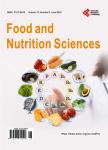Effect of Dietary EGCG on Normal and Vitamin E and Selenium Deficient Rats
Effect of Dietary EGCG on Normal and Vitamin E and Selenium Deficient Rats作者机构:Department of Food Science and Human Nutrition University of Illinois Champaign-Urbana USA Department of Nutrition Sci- ence Purdue University West Lafayette USA.
出 版 物:《Food and Nutrition Sciences》 (食品与营养科学(英文))
年 卷 期:2013年第4卷第8期
页 面:163-173页
学科分类:1002[医学-临床医学] 100214[医学-肿瘤学] 10[医学]
主 题:Vitamin E Deficiency Oxidative Stress EGCG Flavonoid Rat Antioxidant
摘 要:The tea catechin EGCG has been postulated to provide health benefits in humans, to some extent, as an antioxidant. The dose-response effect of dietary EGCG (0, 30, 60, or 120 mg/kg diet) was tested in rats under high versus low oxidative stress conditions that were created by feeding diets adequate in vitamin E and Se (Lox), or deficient in both (Hox) for six weeks. Effects on growth, quinone reductase (NQO1) activity, F2-isoprostanes and nutrient antioxidant amounts in the liver were evaluated as markers of nutrient deficiency and oxidative status. Under Hox conditions consumption of EGCG only at the lowest dose was partially associated with a protection against oxidative stress, reflected by a delay in growth deceleration, but no protection against lipid oxidation. Elevated liver NQO1 activity was observed in this group (4-fold) increasing with the dose;but it was not associated with antioxidant protection. In contrast, under Lox conditions consumption of EGCG was associated with antioxidant activity reflected in a reduction (30%) in F2-isoprostanes and protection of CoQ reduced status in the liver. Overall these results suggest that the antioxidant effect of EGCG in vivo depends on the level of oxidative stress and the presence of other nutrient antioxidants.



